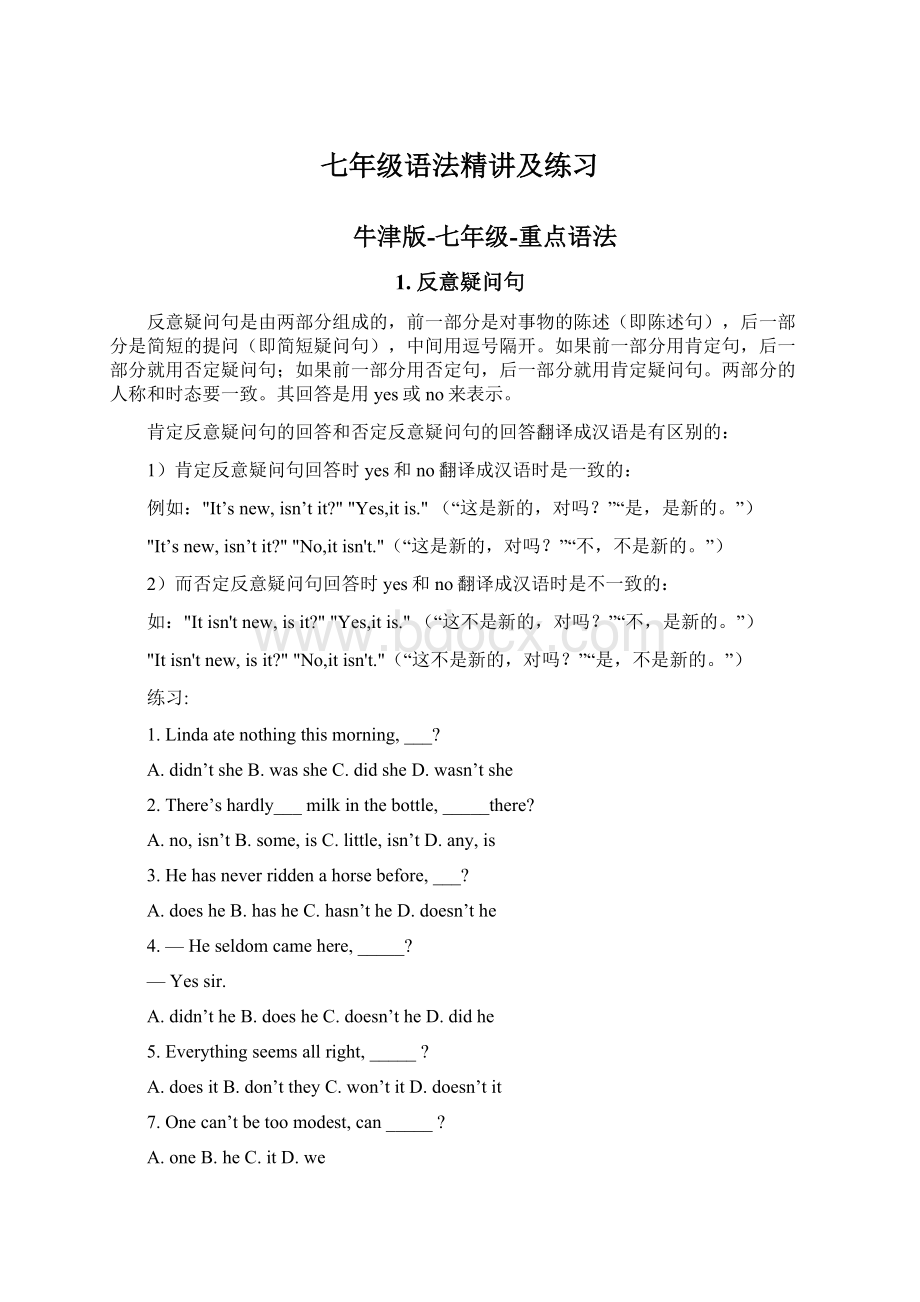七年级语法精讲及练习.docx
《七年级语法精讲及练习.docx》由会员分享,可在线阅读,更多相关《七年级语法精讲及练习.docx(25页珍藏版)》请在冰豆网上搜索。

七年级语法精讲及练习
牛津版-七年级-重点语法
1.反意疑问句
反意疑问句是由两部分组成的,前一部分是对事物的陈述(即陈述句),后一部分是简短的提问(即简短疑问句),中间用逗号隔开。
如果前一部分用肯定句,后一部分就用否定疑问句;如果前一部分用否定句,后一部分就用肯定疑问句。
两部分的人称和时态要一致。
其回答是用yes或no来表示。
肯定反意疑问句的回答和否定反意疑问句的回答翻译成汉语是有区别的:
1)肯定反意疑问句回答时yes和no翻译成汉语时是一致的:
例如:
"It’snew,isn’tit?
""Yes,itis."(“这是新的,对吗?
”“是,是新的。
”)
"It’snew,isn’tit?
""No,itisn't."(“这是新的,对吗?
”“不,不是新的。
”)
2)而否定反意疑问句回答时yes和no翻译成汉语时是不一致的:
如:
"Itisn'tnew,isit?
""Yes,itis."(“这不是新的,对吗?
”“不,是新的。
”)
"Itisn'tnew,isit?
""No,itisn't."(“这不是新的,对吗?
”“是,不是新的。
”)
练习:
1. Linda ate nothing this morning, ___?
A. didn’t she B. was she C. did she D. wasn’t she
2. There’s hardly___ milk in the bottle, _____there?
A. no, isn’t B. some, is C. little, isn’t D. any, is
3. He has never ridden a horse before, ___?
A. does he B. has he C. hasn’t he D. doesn’t he
4. — He seldom came here, _____?
— Yes sir.
A. didn’t he B. does he C. doesn’t he D. did he
5. Everything seems all right, _____ ?
A. does it B. don’t they C. won’t it D. doesn’t it
7. One can’t be too modest, can _____ ?
A. one B. he C. it D. we
8. No one failed in the exam, _____ ?
A. was he B. did one C. did they D. didn’t he
10. Neither you nor I am a artist, _____ ?
A. am I B. aren’t we C. are we D. ain’t I
11. He can’t be her father, _____ he?
A. is B. isn’t C. can D. can’t
12. They have no time to visit the museum, _____?
A. do they B. haven’t they C. don’t they D. will they
14. You’d better go at once, _____ you?
A. hadn’t B. did C. didn’t D. don’t
15. You’d rather work than play, _____ you?
A. hadn’t B. wouldn’t C. didn’t D. mustn’t
16. You dare not do that, _____ you?
A. don’t B. do C. dare D. daren’t
18. He dislikes the two subjects, _____ he?
A. does B. doesn’t C. is D. isn’t
19. These tools are useless now, _____ ?
A. are they B. aren’t they C. is it D. isn’t it
20. He used to get up at 6:
30, _____ he?
A. didn’t he B. did he C. used he D. wouldn’t he
22. He ought to win the first prize, _______ he?
A. mustn’t B. oughtn’t C. shouldn’t D. Both B and C.
23. Let’s go there by bus, ___?
A. will you B. shall we C. don’t you D. will you
24. Let us go to play football, ___?
A. will you B. shall we C. do we D. are we
25. Don’t forget to give Polly some food and change her water, ___?
A. will you B. shall we C. won’t you D. do you
26. — Let’s go shopping this afternoon, _____?
— All right.
A. will we B. shall we C. don’t we D. are we
27. — Pass me the dictionary, _____?
— Yes, with pleasure.
A. would you B. will you C. won’t you D. wouldn’t you
30. There is little water in the glass, ____?
A. isn’t there B. isn’t it C. is it D. is there
32. There won’t be any concert this Saturday evening, _____ ?
A. will there not B. will there C. is there D. won’t
33. — I guess she taught herself Japanese, ______?
— Yes.
A. don’t I B. did she C. do I D. didn’t she
34. I don’t believe you are right, _____ ?
A. are you B. do you C. won’t you D. do
35. She doesn’t think that Tom sings best in the class, _____ ?
A. does she B. doesn’t she C. does he D. doesn’t he
37. I know you didn’t want to hurt me, _____ ?
A. did you B. didn’t you C. do I D. don’t I
38. If my father were here he would be very happy, _____ ?
A. weren’t he B. were he C. wouldn’t he D. would he
Key:
1—5 CDBDD 6—10 BACDC 11—15 AABAB 16—20 CCBBA 21—25CDBAA 26—30 BBBAD31—35 BBDAA 36—38 AAC
初中反意疑问句练习
完成下列反意疑问句
1、You'reinGradetwonow,_____________?
2、Yourfatherisaworker,________________?
3、MaryisgoingtostudyChinese,_____________?
4、We'regoingtohaveameetingthisweek,______________?
5、Jackisplayinginthegarden,_____________?
6、Theyalllookfine,____________?
7、YoulikeEnglish,_____________?
8、Kateswimsthebestinherclass,____________?
9、MikewatchesTVeveryday,_______________?
10、Theylikespringbest,_________________?
11、Theywon'thaveagoodtime,_______________?
12、Hewillgotoseeafilm,_________________?
13、Sheisn'tgoingtobuyabook,______________?
14、TomandMikearewatchingTV,_____________?
15、Youaredoingsomewashing,______________?
16、MrsWhiteiscleaningtheroom,______________?
17、Ibadarestamomentago,_______________?
18、Hewasateacherayearago,______________?
19、TheywroteletterslastSunday,_____________?
20、MrSmithmadeatablelastyear,_____________?
21、Don'topenthedoor,_______________?
22、Let'sgotoschool,________________?
23、Listentome,______________?
24、There'slittlewaterintherive,________________?
25、Thelittlegirlcanhardlyread,______________?
26、HehasneverbeentoJapan,______________?
27、ThestudentsborrowedfewEnglishbooksfromthelibrary,__________?
28、Katemadefewmistakesintheexam,_______________?
1、aren'tyou2、isn'the3、isn'tshe4、aren'twe
5、isn'the6、don'tthey7、don'tyou8、doesn'tshe
9、doeshe10、don'tthey11、willthey12、won'the
13、isshe14、aren'tthey15、aren'tyou16、isn'tshe
17、didn'tI18、wasn'the19、didn'tthey20、didn'the
21、willyou22、shallwe23、willyou24、isthere
25、canshe26、hashe27、didthey28、didshe
2.现在进行时
一、目前(甚至说话时)进行的动作。
二、目前阶段正在进行,而此刻不一定在进行的动作。
现在进行时是由be(am/is/are)
+v.-ing(动词现在分词)构成。
否定形式是:
amnot
/isn’t/aren’t+v.-ing;一般疑问句形式则是Am/Is/
Are+主语+v.-ing?
常和现在进行时连用的时间状
语有:
now,atthemoment,theseyears/months/weeks/days等或者句中有listen,look,此外,我们还可以根据上下句来判断是否用现在进行时。
某些表示思想、感觉、所属或状态等静态动词如believe,think,know,understand,love,like,see,hear,smell,taste,want,own等,一般不用现在进行时。
练习:
1.-They_____aboutSuperVoiceGirl.Let'sjointhem.
-OK.Let'sgo,
A.talkB.talked
C.aretalkingD.havetalked
2.-Listen,what'sthenoise?
-Mybrother_____theprogrammeoftheWorldCupinthesitting-room.
A.watchesB.iswatching
C.haswatchedD.willwatch
3.-What'syourbrotherdoinginhisroomnow?
-He_____akite.
A.makesB.made
C.ismakingD.willmake
4.-Excuseme.WhereisLily?
-Oh,she_____thevolleyballmatchontheplayground.
A.watchesB.willwatch
C.iswatchingD.watched
5.Listen!
They_____aboutHarryPotter.Let'sjointhem.
A.aretalkingB.talk
C.havetalkedD.talked
6.-WhereisFranknow?
-He_____hisbikeintheyard.
A.fixesupB.fixingup
C.isfixingupD.fixed
7.-Whereismydad,Mum?
-Heisn'tathome.Iguesshe_____grassinthegardennow.
A.cutB.hascut
C.willcutD.iscutting
8.-Where'syourfather,Mike?
-He_____inthekitchen.
A.cooksB.cooked
C.iscookingD.hascooked
9.-Who_____thatpiano?
-Mysister,whenshe_____time.
A.plays;hasB.isplaying;has
C.plays;ishavingD.isplaying;hashad
10.Whydoyoucallitdinnerwhenwe_____atnoon?
A.eatB.areeating'
C.haveeatenD.willeat
现在进行时
1.C
2.B由上句中的listen可判断。
3.C4.C5.A6.C7.D8.C9.B10.B
3.when,while和as的区别
①时间连词while,as与when是同义词,均可解为“当……时候”,用来引导时间状语从句。
when引导的状语从句时态用一般过去时或一般现在时,而while后的状语从句时态是进行时,其次when和while在表示时间上,when往往指时间上的一点,而while指一段时间,while另指“在……的同时”
Eg.Theheadmastercameintotheclassroomwhilehewastalkingloudly.
ShebegantolearnEnglishwhenshewasfive.
②as有时可与when,while通用,但它着重指主句和从句中的动作或事情同时发生,不是一前一后。
Aswewalked,wetalked.
练习
一.改错
1.SheisfatbutIamthin.
2.Itwasrainingwhilewearrived.
3.Shesangwhilehewalked.
二.选择最佳答案:
1.ShethoughtIwaspraisingherchild,_____,infact,Iwasscoldinghimforhisbadbehaviorsatschool.
A.whatB.whileC.sothatD.therefore
2.Idoeverysinglebitofhousework____myhusbandBobjustdoesthedishesnowandthen.(2004全国卷II35)
A.whileB.sinceC.whenD.as
3.______itisexpectedthatstudentscomeuniversitywiththeabilitytotakeagoodsetofnotes,thisisnotalwaysthecase.
A.WhenB.AsC.ForD.While
4.Wewereswimminginthelake___suddenlythestormstarted.
A.whenB.whileC.untilD.before
5.JustIstoppedmycar,amancameuptome.
A.WhenB.AsC.ForD.While
6.youhavefinishedyourwork,youmayhavearest.
A.WhenB.AsC.ForD.While
7.Asthedaywenton,theweathergotworse.
A.WhenB.AsC.ForD.While
答案
一、
1.but改成while。
因为fat与thin形成对比
2.while改成when。
因为arrived为短暂动词
3.while改成as。
表示“一边…一边…”
二.1.选B。
while并列连词,表对比,意为,“而,但是”
2.选A.while含有对比之意,意为“然而”。
3.选D.在此句中while表示“尽管”。
4.选A。
wasdoing···when···一个固定句式。
\
5.选A和B。
as,when引导短暂性动作的动词。
6.当从句的动作发生于主句动作之前,只能用when引导这个从句,不可用as或while。
4.also,too,either与aswell的用法区别
1)too和aswell多用于口语中,语气较轻,通常用于肯定句或疑问句,一般不用于否定句,且通常放在句末。
如:
Aretheycoming,too[aswell]?
注意:
在Metoo;Youtoo这类简略答语中,通常不用aswell或also。
2)also比too和aswell正式,一般也不用于否定句,它在句中的位置通常是紧靠动词,即放在行为动词之前,特殊动之后。
有时为了强调也放在句末(但不常见)。
如:
Sheisyoungandbeautiful,andalsorich.
说明:
also有时用于句首(其后通常有逗号),相当于连词and。
如:
Also,hismotherwasdead.
3)either(也)通常只用于否定句,且要放在句末。
如:
Hehasn’tfinishedit,either.
5.反身代词
1)列表
I
you
you
she
he
myself
yourself
yourselves
herself
himself
we
they
it
one
ourselves
themselves
itself
oneself
2)做宾语
a.有些动词需有反身代词
absent,bathe,amuse,blame,dry,cut,enjoy,hurt,introduce,behave
Weenjoyedourselvesverymuchlastnight. 我们昨晚玩得很开心。
Pleasehelpyourselftosomefish. 请你随便吃点鱼。
b.用于及物动词+宾语+介词
takepridein,beannoyedwith,helponeselftosth.
Icouldnotdress(myself)upatthattime. 那个时候我不能打扮我自己。
注:
有些动词后不跟反身代词,getup,sit-down,standup,wakeup等。
Pleasesitdown. 请坐。
3)作表语;同位语
beoneself:
Iamnotmyselftoday. 我今天不舒服。
Thethingitselfisnotimportant. 事情本身并不重要。
4)在不强调的情况下,but,except,for等介词后宾语用反身代词或人称代词宾格均可。
如:
Noonebutmyself(me)ishurt.
注意:
a.反身代词本身不能单独作主语。
(错)Myselfdrovethecar.
(对)Imyselfdrovethecar. 我自己开车。
b.但在and,or,nor连接的并列主语中,第二个主语可用反身代词,特别是myself作主语。
Charlesandmyselfsawit.
5)第二人称作宾语,要用反身代词。
Yous